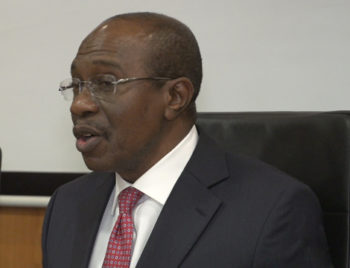
The Governor of Central Bank of Nigeria (CBN), Mr. Godwin Emefiele has said inflation rate declined by about 15 per cent over the past 11 months as fiscal and monetary reforms continue to impact positively on the Nigerian economy.
Delivering the 47th Convocation Lecture of the University of Nigeria, Nsukka, (UNN) entitled “A Mindset for Succeeding in Today’s Nigeria” yesterday, Emefiele pointed out that inflation had declined from a peak of 18.7 per cent in January 2017 to 15.9 per cent in November.
The apex bank chief lauded the improvements in the macro economy noting that the Gross Domestic Products (GDP) recovered after five quarters of continuous contraction, recording positive growth of 0.7 per cent and 1.4 per cent respectively in second and third quarters of 2017.
He added that the exchange rate has appreciated significantly from N525/$1 in February 2017 to about N360/$1 now, tapering premium across various windows and segments of the market.
“Foreign exchange supply has improved since the establishment of the Investors & Exporters Window, with autonomous inflows of over $10 billion through this window alone from April 2017 to date. Foreign Exchange Reserve has recovered significantly from a low of just over $23 billion in October 2016 to about $35.2 billion by November 27, 2017,” Emefiele said.
He pointed out that the World Bank’s “Doing Business Indicators” for 2018 indicated improvement in Nigerian macro economy as Nigeria rose by 24 places to rank 145 out of 190 countries.
According to him, there has been a significant boost in local production, which is due to CBN’s development finance efforts and the dogged implementation of its foreign exchange policies.
“Today many local manufacturers are reporting major boosts to their revenue and profit,” Emefiele said.
Emefiele said that the growing Nigerian population presents additional opportunities for economic empowerment for Nigerians.
He noted that Nigeria is now estimated to have a population of over 180 million people and this population is predicted by the United Nations to grow to 398 million people in 2050, which would make Nigeria, the third largest in the world by that time.
According to him, the population trend presents a significant opportunity for Nigerian graduates to turn whatever challenge they may be facing into opportunities that can harness these demographic shifts.
“Imagine what would happen if Nigeria and Nigerians cannot provide food, shelter, clothing, health, education, and other basic things for this teeming population. Even though these trends should already begin to bother current leaders in our country today, I believe that young Nigerians can begin today to see these trends as opportunities and think of what they can do take advantage of the situation,” Emefiele said.